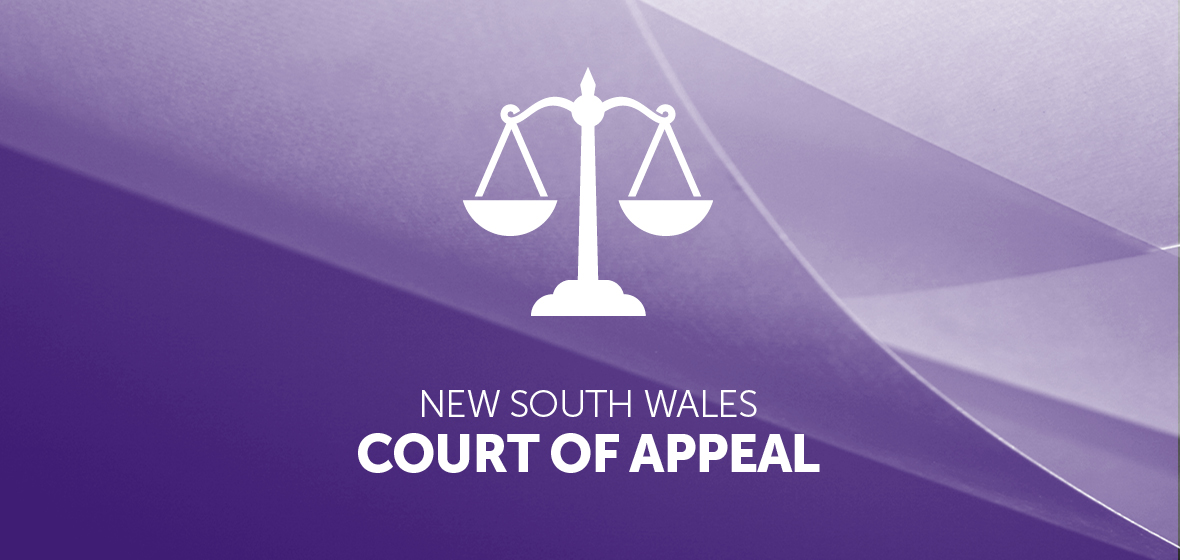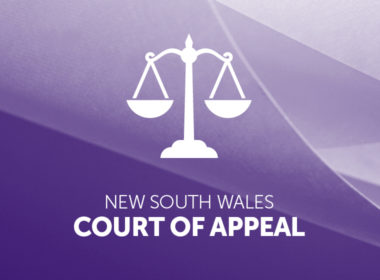Key decisions
- MacDonald v Yakiti Pty Ltd & Ors [2021] NSWCA 114
- Jagatramka v Wollongong Coal Limited [2021] NSWCA 61
- ET-China.com International Holdings Ltd v Cheung [2021] NSWCA 24
- Mainteck Services Pty Ltd v Stein Heurtey SA [2014] NSWCA 184
UNCONSCIONABLE CONDUCT
Australian Securities and Investment Commission Act 2001 (Cth), ss 12CA and 12CB – scope of statutory provisions proscribing unconscionable conduct
MacDonald v Yakiti Pty Ltd & Ors [2021] NSWCA 114
Background: The appellant, Ms MacDonald, had, by October 2016, advanced considerable sums to companies controlled by a Mr Henley, operating gyms across Sydney. This included $450,000 that she borrowed from Yakiti Pty Ltd (‘Yakiti’), which was controlled by Mr Moini. Mr Moini and Mr Prin had also lent monies to the Henley group.
By late October 2016, the financial position of the Henley group companies had become precarious, with landlords threatening to take possession of leased premises. By 31 October 2016, Ms MacDonald, Mr Moini and Mr Prin had discussed a proposal to convert their loans to equity. It had been agreed that Ms MacDonald would advance a further $330,000 to the group, such that her contributions would roughly equal those of Mr Moini and Mr Prin combined.
On 4 November 2016, while the proposal had yet to be implemented, Ms MacDonald was admitted to hospital. She remained there for more than a month. She did not advance the further sum of $330,000.
The day following Ms MacDonald’s admission, Mr Moini sent her a text, expressing the belief that all of the parties were in ‘the best position’ to recover their capital. From 11 November 2016, however, he and Mr Prin began discussing different arrangements for recovering their contributions. Communications between Mr Henley and Mr Moini suggested that Mr Henley would inform Ms MacDonald of what was occurring, but he did not. She did not learn what had occurred until after her discharge on 13 December 2016. Mr Moini and Mr Prin ultimately acquired the goodwill of the businesses formerly carried on by the Henley group. Ms MacDonald was unable to recover the money she had lent to those companies, and she defaulted in her obligation to repay the money she had borrowed from Yakiti.
At first instance: Yakiti commenced proceedings seeking writs of possession over the property that secured Ms MacDonald’s indebtedness. Ms MacDonald cross claimed against Yakiti, Mr Moini and Mr Prin, alleging that their conduct in ‘cutting her out’ of the deal to recover their contributions to the Henley group, while she was in hospital, contravened ss 12CA and 12CB of the Australian Securities and Investments Commission Act 2001 (Cth) (the ‘ASIC Act’).
Hamill J ordered the relief sought by Yakiti and dismissed Ms MacDonald’s cross claim.
Issues on appeal: There were two main issues in the appeal. The first was whether the respondents had engaged in unconscionable conduct. The second was whether Ms MacDonald had established that she had suffered compensable loss by reason of that contravention.
Principles: Sections 12CA and 12CB proscribe unconscionable conduct in connection with financial services. Any difference between the reach of the two sections had no bearing on the outcome of this appeal. The principles governing unconscionability in equity are relevant to these statutory provisions. These include the principle that, once a party establishes that he or she was labouring under a special disadvantage, the onus shifts to the other party to establish to that they did not take unfair or unconscientious advantage of an opportunity arising from that disadvantage.
As to what is meant by the notion of taking unconscientious advantage, the Court referred (at [15] and [39]) to the statement of Gagelar J in ASIC v Kobelt (2019) 267 CLR 1, that s 12CB proscribes conduct ‘that is so far outside societal norms of acceptable commercial behaviour as to warrant condemnation as conduct that is offensive to conscience’.
Decision: The appeal was dismissed, with all members of the Court finding that Ms MacDonald had failed to prove her loss. A majority (Macfarlan and McCallum JJA, White JA contra) did, however, find that the respondents had engaged in unconscionable conduct.
There was no appeal from the finding that, while she was in hospital from 4 November 2016, Ms MacDonald was labouring under a special disadvantage, in that her illness seriously affected her ability to make a judgment as to her own best interests. The issue was whether the respondents had taken unconscientious advantage of that fact.
The decision demonstrates the potential for differing judicial assessments of the limits of acceptable commercial behaviour in a given set of circumstances.
The majority (at [6] and [7]) emphasised the assurances that had been given to Ms MacDonald by the respondents the day after her admission to hospital. This, it was said, gave the impression that she was ‘securely ensconsed in the enterprise’. The majority held that the respondents had failed to discharge their onus of establishing that they did did not take unconscientious advantage of Ms MacDonald’s special disadvantage (at [11] and [15]).
White JA gave greater weight (see [198] and [206]) to the urgent need of the Henley companies for further capital and Ms MacDonald’s failure to contribute the $330,000 as agreed before her admission to hospital. Whlie his Honour did not ignore the assurance given in the email of 5 November 2016 (see [202]), his Honour gave it less weight, given the absence of evidence that Ms MacDonald had altered her position in reliance on it.
All members of the Court found that Ms MacDonald had failed to prove any loss by reason of the conduct of the respondents. The evidence could not establish the value of any share in the new companies established by Mr Moini and Mr Prin, that Ms MacDonald might have had an opportunity of acquiring, had she not been excluded from the discussions during her admission to hospital.


